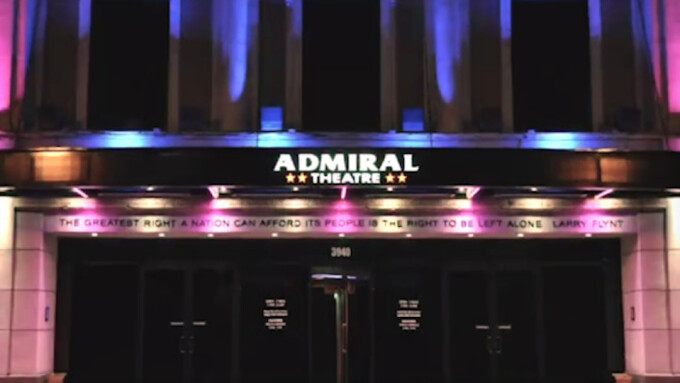CHICAGO — A popular Chicago adult entertainment venue is suing the city and Cook County over millions of dollars owed in back amusement taxes.
The Admiral Theatre is a legendary venue currently operating as a strip club, whose facade bears the Larry Flynt quote, “The greatest right a nation can afford its people is the right to be left alone.”
The Admiral filed a lawsuit on July 29 in Chicago federal court, challenging the 9% city and 3% county amusement taxes. The City of Chicago has claimed a $3 million assessment for “underpayments over seven years,” according to the Chicago Tribune.
For Admiral owner Sam Cecola, according to the Tribune, the central issue is “whether requiring adult entertainment venues to pay the amusement taxes while exempting other small theaters is a violation of Free Speech.”
“It’s as if this law was designed to put us out of business,” Cecola told the newspaper.
An annual city audit had found that Admiral had apparently “not collected the amusement tax for fees paid by customers to dancers, who are independent contractors.”
“The city and county only advised us we were responsible for collecting from the entertainers seven years later, and sent us a bill, ” Cecola explained. “We should be exempted from this tax as are all other small theater venues.”
The city’s amusement tax has existed since 1947, and the county’s since 1997. However, in January 1999, even though live cultural performances at smaller venues remained exempted, the Tribune reported, “the City Council tweaked the amendment to require adult entertainment cabarets to pay the tax.”
Theaters with fewer than 1,500 seats — except for adult entertainment venues — are exempted from both city and county amusement taxes. The Admiral has about 250 seats.
The lawsuit points out that the Admiral has indeed sent the city about $500,000 a year for amusement taxes on cover charges and its portion of private booth income and dance rentals. The Admiral, however, “did not collect and remit amusement tax on the portion of the dance income paid directly to the entertainers.”
Cecola said he had been negotiating with the city for about a year to reduce the back taxes owed, but discussions fell off during the onset of the pandemic. The Admiral is represented by Luke Lirot, a Tampa Bay, Florida attorney specializing in civil rights cases and the adult entertainment industry.
SBA Lawsuit Settled
Back in May, The Admiral sued the Small Business Administration (SBA) and Secretary of the Treasury Steve Mnuchin alleging that its First Amendment rights were being violated because their COVID-19 relief loan application had been stalled.
The theater’s lawyers claimed that the application for a PPP loan to help with their payroll is not being approved because of a clause preventing “prurient” businesses from receiving federal funds.
The “prurient” clause on the loan application form, as XBIZ has been reporting, replicates mid-1990s language designed to discriminate against sexually oriented businesses.
The form compels applicants to declare that they do not “present live performances of a prurient sexual nature or derive directly or indirectly more than de minimis gross revenue through the sale of products or services, or the presentation of any depictions or displays, of a prurient sexual nature.”
The word “prurient” is an imprecise, obscure word that means “appealing to unhealthy sexual interests” and was used by the U.S. Supreme Court in a landmark 1973 ruling. Several members of the adult entertainment community and First Amendment lawyers have pointed out that people who do not consider their sexual expression “unhealthy” are exempt from application of the “prurient” clause.”
The Chicago theater’s lawyers allege that “all of the entertainment provided by the Admiral is non-obscene (and thus cannot be deemed prurient).”
The Tribune reports that the PPP lawsuit was eventually settled, and the SBA approved a nearly $400,000 loan in June.







